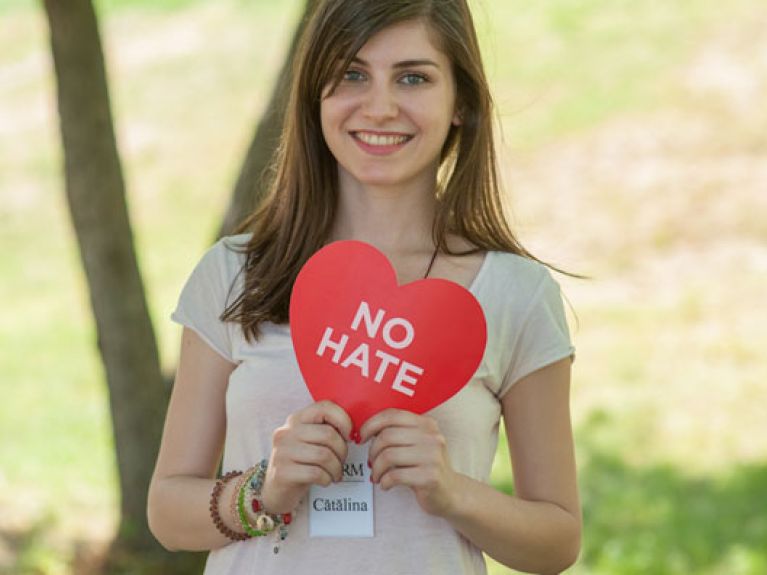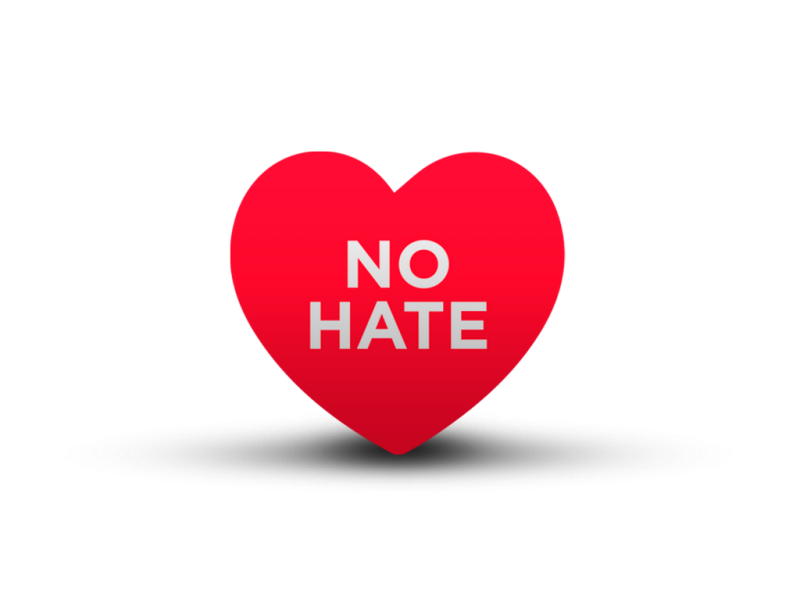
El término "anti hate" se refiere a la oposición al odio. Se puede utilizar para describir a personas, grupos u organizaciones que trabajan para combatir el odio, o para describir acciones o políticas que tienen como objetivo prevenir o reducir el odio.
El odio se puede definir como un sentimiento de resentimiento o aversión intensa hacia una persona o grupo. Puede estar motivado por una variedad de factores, como la raza, la religión, la orientación sexual, la discapacidad o las creencias políticas.
El odio puede manifestarse de diversas maneras, incluyendo el discurso de odio, la violencia y la discriminación. El discurso de odio es el uso de lenguaje que incita al odio o la violencia contra una persona o grupo. La violencia es el uso de la fuerza física para dañar o matar a una persona o grupo. La discriminación es el trato injusto de una persona o grupo en base a su raza, religión, orientación sexual, discapacidad o creencias políticas.
Hay muchas formas de combatir el odio. Algunas de las formas más comunes incluyen:
- Educación: La educación es una de las formas más efectivas de combatir el odio. Al enseñar a las personas sobre los peligros del odio y la importancia de la tolerancia, podemos ayudar a crear una sociedad más justa e inclusiva.
- Leyes: Las leyes pueden ayudar a prevenir y castigar el odio. Las leyes que prohíben el discurso de odio, la violencia y la discriminación pueden ayudar a crear un entorno más seguro para todos.
- Organizaciones: Hay muchas organizaciones que trabajan para combatir el odio. Estas organizaciones brindan educación, apoyo y recursos a las personas que han sido víctimas del odio.
Cada uno de nosotros tiene un papel que desempeñar en la lucha contra el odio. Podemos ayudar de diversas maneras, incluyendo:
- Hablar en contra del odio: Cuando vemos o escuchamos algo que es odioso, debemos hablar en contra de ello. Es importante dejar claro que el odio no es aceptable.
- Educar a otros: Podemos educar a otros sobre los peligros del odio y la importancia de la tolerancia. Podemos hacerlo compartiendo información, participando en conversaciones y apoyando organizaciones que luchan contra el odio.
- Ser un modelo a seguir: Podemos ser un modelo a seguir para los demás al ser tolerantes y respetuosos con todos, independientemente de su raza, religión, orientación sexual, discapacidad o creencias políticas.
Conclusiones
El odio es un problema real que puede tener un impacto devastador en las vidas de las personas. Es importante que todos trabajemos juntos para combatir el odio y crear una sociedad más justa e inclusiva.
-
Anti hate
-
Odio
-
Discurso de odio
-
Violencia
-
Discriminación
-
Educación
-
Leyes
-
Organizaciones
-
Individuos
-
El movimiento anti hate trabaja para combatir el odio en todas sus formas.
-
Las leyes anti hate ayudan a prevenir y castigar el odio.
-
Las organizaciones anti hate brindan educación y apoyo a las personas que han sido víctimas del odio.
-
Cada individuo puede ayudar a combatir el odio hablando en contra de él, educando a otros y siendo un modelo a seguir.
Anti hate crime: Más de 176 ilustraciones y dibujos de stock con licencia libres de regalías | Shutterstock

La campaña “No Hate Speech”

Source: deutschland.de
Cómo combates la discriminación y el racismo? | Injuve, Instituto de la Juventud.

Source: Injuve
Que Significa Anti Hate, The Anti-Hate Group That Is a Hate Group, 7 MB, 05:06, 4,163,344, PragerU, 2017-10-12T09:09:53.000000Z, 2, Anti hate crime: Más de 176 ilustraciones y dibujos de stock con licencia libres de regalías | Shutterstock, Anti hate crime: Más de 176 ilustraciones y dibujos de stock con licencia libres de regalías | Shutterstock, 600 x 600, jpg, , 3, que-significa-anti-hate, KAMPION
Que Significa Anti Hate.
The Southern Poverty Law Center bills itself as a watchdog of hate groups. But is this just a cover for its true aims? Journalist and author Karl Zinsmeister explains.
Donate today to PragerU! l.prageru.com/2ylo1Yt
The Southern Poverty Law Center logo and all other logos used in this editorial are the property of their respective owners; their use is not intended to suggest that the editorial is in any way authorized by, sponsored by, or associated with their respective owners.
Have you taken the pledge for school choice? Click here! schoolchoicenow.com
Get PragerU bonus content for free! prageru.com/bonus-content
Download Pragerpedia on your iPhone or Android! Thousands of sources and facts at your fingertips.
iPhone: l.prageru.com/2dlsnbG
Android: l.prageru.com/2dlsS5e
Join Prager United to get new swag every quarter, exclusive early access to our videos, and an annual TownHall phone call with Dennis Prager! l.prageru.com/2c9n6ys
Join PragerU’s text list to have these videos, free merchandise giveaways and breaking announcements sent directly to your phone! optin.mobiniti.com/prageru
Do you shop on Amazon? Click smile.amazon.com and a percentage of every Amazon purchase will be donated to PragerU. Same great products. Same low price. Shopping made meaningful.
VISIT PragerU! prageru.com
FOLLOW us!
Facebook: facebook.com/prageru
Twitter: twitter.com/prageru
Instagram: instagram.com/prageru/
PragerU is on Snapchat!
JOIN PragerFORCE!
For Students: l.prageru.com/29SgPaX
JOIN our Educators Network! l.prageru.com/2c8vsff
Script:
Shutting down people you don’t agree with is about as un-American as you can get.
Rigorous debate, honest discussion, open exchange of ideas—that’s the American way.
But free thinking and speech are threatened today by a group with a sweet-sounding name that conceals a nefarious purpose. This group is called the Southern Poverty Law Center, or SPLC.
Originally founded as a civil-rights law firm in 1971, the SPLC reinvented itself in the mid-‘80s as a political attack group. Every year now it produces a new list of people and charities it claims are “extremists” and “haters.”
Aided by glowing coverage from the establishment media, the SPLC’s hate list has become a weapon for taking individuals and groups they disagree with and tarring them with ugly associations.
The SPLC employs a two-pronged strategy:
First, find a handful of crazies with barely any followers, no address, and no staff, and blow them up into a dangerous movement— proof that there are neo-Nazis lurking everywhere. On their notorious “Hate Map,” the SPLC lists 917 separate hate groups in the U.S.! No one has even heard of more than a handful of them.
The second strategy of the SPLC is to undermine legitimate political voices that they oppose by associating them with extremists like the KKK.
Take the charity known as the Alliance Defending Freedom. The SPLC lists them as a “hate group.” Is that fair? Well, the ADF has a network of 3,000 attorneys from all across the U.S. who’ve donated more than a million volunteer hours in defense of religious liberty. They’ve had a role in 49 victories at the U.S. Supreme Court. Putting the Alliance Defending Freedom on a list with 130 Ku Klux Klan chapters is not only wrong, it’s malicious.
According to the SPLC, one of the most influential social scientists in the U.S.— Charles Murray—is a, quote, “white nationalist.” Ayaan Hirsi Ali, perhaps the most eloquent spokesperson for the rights of Muslim women, is, to the SPLC, a “toxic… anti-Muslim extremist.”
Scores of other individuals and charities active in mainstream conservative or religious causes have likewise been branded by the Southern Poverty Law Center as threats to society.
Mind you, it is entirely fair to disagree with any of those folks. But it is utterly unfair to call them haters or extremists. The largest category listed by the SPLC as extremists—with 623 entries—covers groups like the Tea Party organizations that are wary of centralized government. Last time we checked, favoring smaller government was a mainstream and perfectly honorable American tradition.
What is not honorable is the course prescribed by a leader of the SPLC, Mark Potok, who was caught on video proclaiming the organization’s true intentions. He told a group of supporters, quote, “the press will describe us as ‘monitoring hate groups’…. I want to say plainly that our aim in life is to destroy these groups, to completely destroy them.”
Portraying someone with political views different from your own as a public menace is bullying.
And it’s a dangerous game. Instead of reducing hate and violence, the SPLC’s name-calling directly incites it.
For the complete script, visit prageru.com/videos/anti-hate-group-hate-group
Anti hate crime: Más de 176 ilustraciones y dibujos de stock con licencia libres de regalías | Shutterstock
The Anti-Hate Group That Is a Hate Group

Source: Youtube.com
Es normal en mexico pero en corea tiran hate

Source: Youtube.com